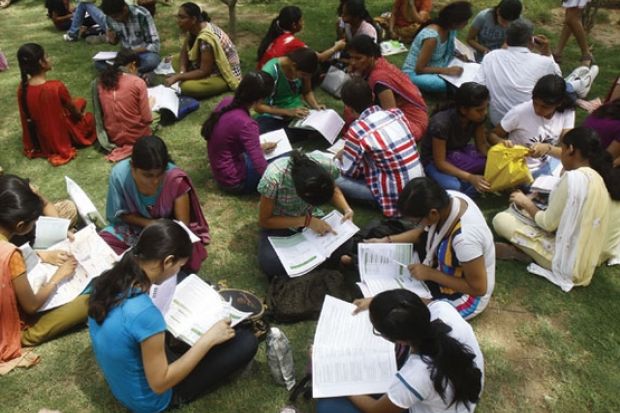Credit: GettyGet the infrastructure up to speed: India plans to have an extra 10 million student places in the next five years
India must welcome foreign universities to improve the quality of its graduates, the country’s new minister of state for human resource development has said, amid suggestions that the ministerial reshuffle that put him in place could ease the path of much-delayed legislation to open up the nation’s academy.
Shashi Tharoor, whose portfolio as minister of state includes higher education, said that India was failing to produce “well-educated” graduates because its system was out of step with other emerging economies in terms of international engagement.
“Whereas the Middle East and China are going out of their way to woo foreign universities to set up campuses in their countries, India has turned away many academic suitors who have come calling in recent years,” Dr Tharoor said.
The Parliament of India has yet to pass a bill, first mooted in 1995, to regulate the operation of foreign universities in India, allowing them to set up full campuses and award their own degrees in the country.
Observers of India’s academy were uncertain whether Dr Tharoor’s statement and a shake-up of the ministers responsible for higher education would lead to the bill finally being passed.
Kavita Sharma, director of the India International Centre in New Delhi and author of Internationalization of Higher Education: An Aspect of India’s Foreign Relations (2008), welcomed the appointment. But she warned that it did not mean the bill would become law.
“Passing bills depends on getting the opposition on board,” Dr Sharma said. “In India, very often resistance has nothing to do with the issue at hand: it often has something to do with the larger politics at play.”
The uncertain policy environment has made it difficult for foreign institutions to engage fully in the country or even plan to do so. They are currently restricted to twinning agreements with local bodies and jointly delivered degrees.
Muscular response
Strong political muscle has already been applied to the situation but to no avail: Kapil Sibal, the previous Cabinet minister for human resource development until the reshuffle at the end of October, is also in charge of the Department of Telecommunications and is one of the government’s three main spokespeople.
“Mr Sibal is a very able and well-educated man and made a very good contribution, but he had too much on his plate and was trying to do too many different things,” Dr Sharma said. “This new team doesn’t have the baggage and isn’t at loggerheads with the opposition over other things, so let’s see: this bill could pass.”
The desire - and need - for foreign intervention remains strong. Pallam Raju, who replaces Mr Sibal as Cabinet minister for human resource development, said recently that only 53 per cent of India’s IT engineering graduates are employable. And a survey by India’s University Grants Commission suggests that 68 per cent of domestic universities and 73 per cent of its colleges are of low or middling quality.
Dr Tharoor said it would not be necessary for Indians to go abroad to study if foreign institutions were allowed to set up fully in the country. Speaking at the Federation of Indian Chambers of Commerce and Industry’s Higher Education Summit in New Delhi, he said there was elite provision at the Indian Institutes of Technology and the Indian Institutes of Management, but these were “islands in a sea of mediocrity”.
He promised to kick-start 20 pending bills relating to higher education that have so far been blocked by political opposition. Such momentum is required urgently, since India plans to add 10 million student places in the next five years.
“We will also work towards putting our reform agenda back on track,” added Dr Tharoor, who has held senior posts at the United Nations and was minister for external affairs until 2010.
No panacea
Dipankar Gupta, former professor of sociology and social anthropology at Jawaharlal Nehru University, New Delhi and author of The Caged Phoenix: Can India Fly? (2010), said that even if foreign universities were allowed to operate fully in India, they would make little difference to provision.
“What we need is to get our own university infrastructure up to speed. Foreign universities will take care only of a very small fraction of the capacity required,” Professor Gupta said.
He added that it was “superficial” to suggest that overseas universities operating in India would solve the nation’s higher education problems.
“The most important thing is that we have not paid enough attention to research and development and cutting-edge research, so our universities are just teaching institutions. We need to upgrade our intellectuals,” he said.
Register to continue
Why register?
- Registration is free and only takes a moment
- Once registered, you can read 3 articles a month
- Sign up for our newsletter
Subscribe
Or subscribe for unlimited access to:
- Unlimited access to news, views, insights & reviews
- Digital editions
- Digital access to THE’s university and college rankings analysis
Already registered or a current subscriber? Login
